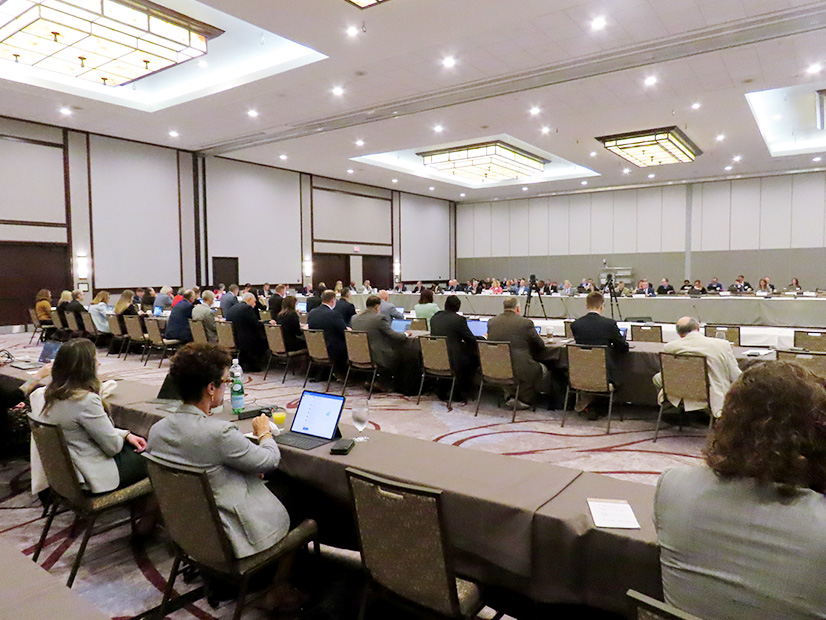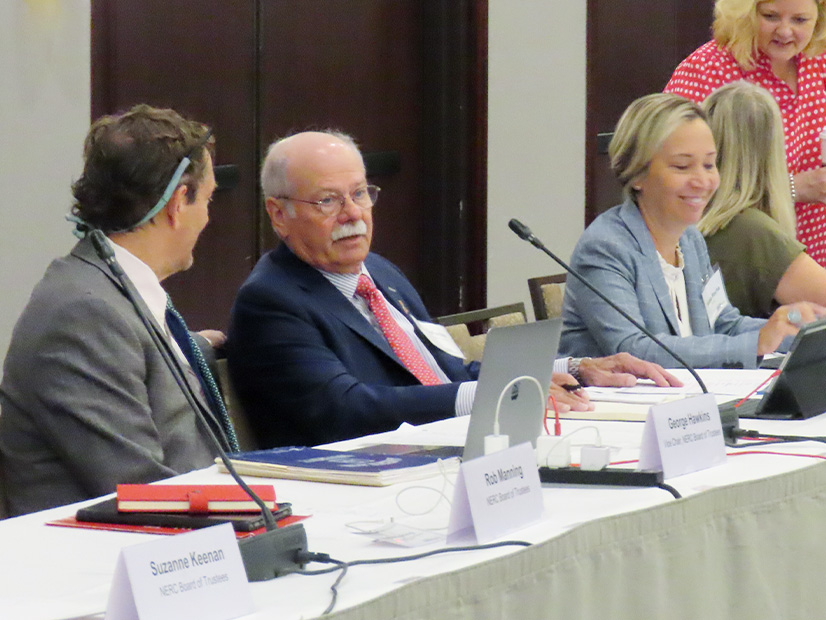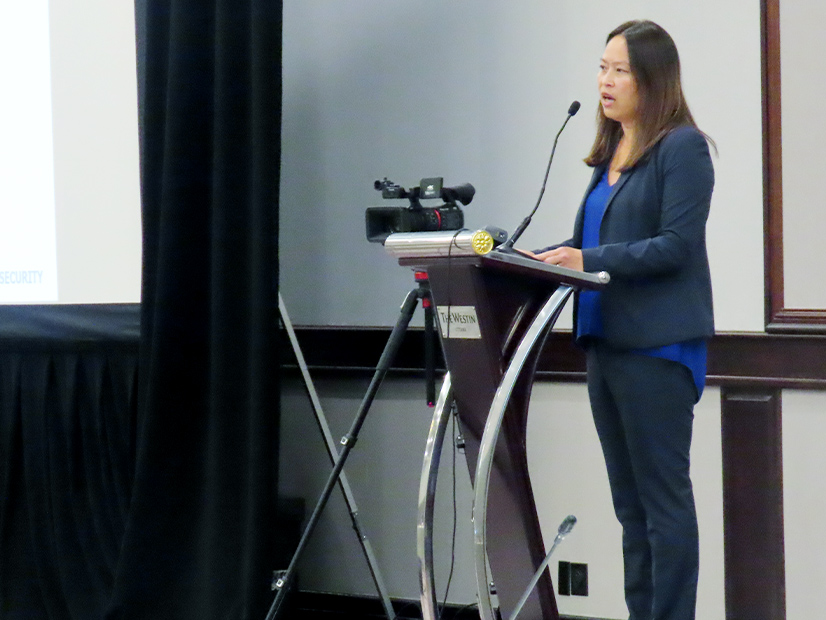OTTAWA, Ontario — As NERC’s Board of Trustees and Member Representatives Committee gathered in Ottawa this week, attendees took the opportunity to remark on the recent anniversary of a major milestone in the ERO’s history.
“Twenty years ago this past Monday, an obscure tree fell on a power line in Ohio, triggering a disastrous chain of events culminating in 55 million people without electricity, and almost 100 people dead,” said David Morton, chair of Canada’s Energy and Utility Regulators (CAMPUT). “As you all know, this event gave birth to NERC as we know it today, a corporation [that’s] probably unique in the world … However, unlike Sergeant Pepper’s band, which kept coming in and out of style, NERC’s mission not only doesn’t go out of style, but grows ever more important.”
Morton’s address on Thursday wasn’t the only reference to the August 2003 blackout, nor was he the only speaker to slip a Beatles reference into his remarks. Manny Cancel, NERC senior vice president and CEO of the Electricity Information Sharing and Analysis Center, shared his memory of “not going home and staying in my office for those two days,” and NERC staff shared a video they made with ReliabilityFirst and NPCC reminiscing on the event and the lessons learned since.
NERC CEO Jim Robb — who was unable to fly to Ottawa but listened via web conference — told ERO Insider before the meeting that he considered the legacy of the 2003 blackout to be the ERO Enterprise’s collaborative model of seeking input from all stakeholders in the electric grid.
“The thing that I always tell utilities is that, when we put in place a standard, it’s never about you — it’s about your neighbor. Because you want to make sure that your neighbor is operating their system the same way you are,” Robb said. “That’s really critical, given the interconnected nature of the grid. … We learned that in [the blackout of] 1965, and we relearned it in 2003.”
2024 Budget Approved
NERC’s final 2024 business plan and budget passed its penultimate hurdle at Thursday’s board meeting, with trustees agreeing to the document after members of the Finance and Audit Committee approved it at their meeting the day before. The budget will now be submitted to FERC for final approval.
Speaking at the FAC meeting, NERC CFO Andy Sharp reviewed revisions to the budget since the drafts were submitted for public comment in May. (See Personnel, Meeting Costs Drive 2024 ERO Budget Hikes.) NERC’s final budget has been set at $113.6 million, $3 million higher than the draft budget.
The biggest driver of the increase is a $3 million charge associated with the Interregional Transfer Capability Study (ITCS), an 18-month effort ordered by Congress earlier this year in the Fiscal Responsibility Act. NERC was able to account for $400,000 of the ITCS cost by repurposing funds intended for contractors and consultants. The rest will be split between the organization’s Assessment Stabilization Reserve and Operating Contingency Reserve, meaning that assessments will be unchanged from the $97 million in the draft budget.
Another added cost is a $400,000 charge for constructing a new database platform for NERC’s system operator certification and continuing education program. This too is expected to have no impact on the ERO’s assessment because it will be funded entirely from the System Operator Certification Reserve.
Standards Process Changes Accepted
Introducing a set of proposed changes to NERC’s reliability standards development process, Soo Jin Kim, NERC vice president of engineering and standards, thanked stakeholders for supporting the ERO in the “concerted effort” to streamline its internal procedures.
“I do believe this is a long process, and it has been a very fruitful process, but I’m very pleased today because the work product that we are delivering is going to allow for the ERO Enterprise to fulfill its statutory obligations and to provide for more agile and efficient processes,” Kim said.
The revisions, which trustees approved for filing with FERC, will affect NERC’s Rules of Procedure, particularly Section 300, which governs standards development, and Appendix 3A — NERC’s Standard Processes Manual.
Among the most significant changes is a new Section 322, which gives NERC’s board “the authority to direct the development of a reliability standard in extraordinary circumstances … to address an urgent reliability issue.” Under the Section 322 process, the board will issue a preliminary written notice of its intent to issue a directive, along with its reasoning.
Stakeholders will have the opportunity to weigh in during a public comment period of at least 45 days, after which the board will issue a final determination in writing, along with a consideration of comments received. Upon final determination, any impacted party will have the opportunity to request rehearing or clarification.
Kim emphasized that Section 322 was meant to be considered only “a failsafe [that] will not replace our stakeholder model that we’re all very connected to.” She said the changes were necessary to meet the ERO’s “statutory obligations under Section 215” of the Federal Power Act.
Trustees also agreed to adopt reliability standards TOP-003-6 (Transmission operator and balancing authority data and information specification and collection) and IRO-010-5 (Reliability coordinator data specification and collection), along with their implementation plan. The standards were developed under Project 2021-06, which was started to address potential administrative burdens identified in previous versions of the standards by NERC’s Standards Efficiency Review.
Compliance Committee Renamed
NERC’s Compliance Committee held its last meeting on Wednesday — at least the last under that name. The committee approved a set of amendments to its charter that the board approved the following day, changing its name to the Regulatory Oversight Committee.
The name change is intended to reflect the committee’s evolving scope, after members determined that because of the “current volume and complexity of standards-related projects and issues,” NERC requires “increased focus and oversight” in the standards development process. The committee’s new responsibilities include:
-
- Ensuring that the standards program addresses appropriate strategic priorities;
- Monitoring the overall results of the standards development process;
- Assessing the efficiency of standards and their effectiveness at addressing targeted reliability risks;
- Monitoring progress in addressing regulatory mandates and standards-related directives; and
- Responding to the board’s requests for advice and recommendations on standards-related matters.
Future Meetings
The Ottawa meeting was the second and final in-person gathering of the year for the board and MRC, after the February meetings in Tucson, Ariz. Members and trustees will hold their final meetings virtually. However, unlike previous virtual gatherings in which the MRC and board met within a day of each other, these events will be separated by almost two months: the MRC will meet on Oct. 25, and the board will hold its final meeting on Dec. 12.
Next year’s meeting schedule will look similar to that of 2023, with face-to-face gatherings in Houston on Feb. 14-15 and Vancouver on Aug. 14-15. May’s meetings will follow a hybrid format, with members and trustees gathering at NERC’s D.C. office and all other participants attending virtually, and the final meetings (Dec. 13 for the board and an undetermined time in October for the MRC) will again be held entirely online.






